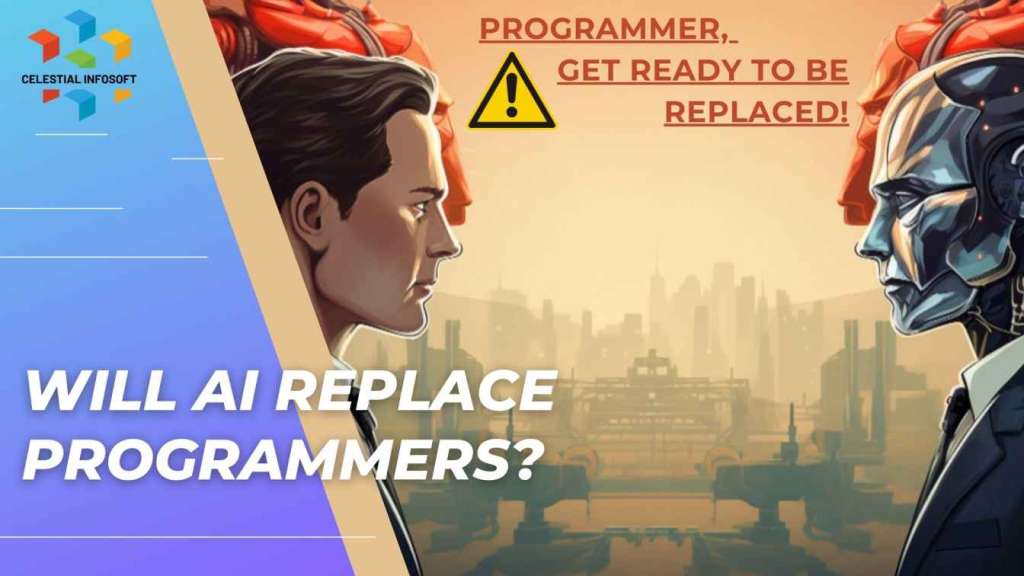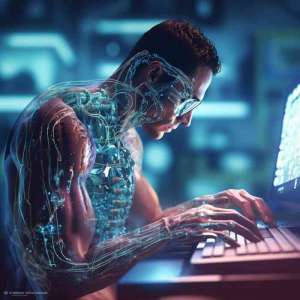Will AI replace programmers? Really

The subject of whether artificial intelligence (AI) will replace programmers is a hot topic in the technology field. With AI’s fast growth, many people question if it will one day replace human programmers. In this blog article, we will look at the current technologies and analyze whether AI will eventually replace programmers.
What is Current Position of AI in Programming?
Artificial intelligence has made amazing progress in automating basic and repetitive programming activities. Automated code generation tools use machine learning methods to identify patterns in existing codebases, allowing them to produce not only code snippets but also full functions. This speeds up the development process and decreases the pressure on human programmers for jobs that are considered routine.
AI-enabled tools aid programmers with code completion, propose changes, and provide context-aware recommendations, speeding the coding process and increasing overall productivity. However, it is critical to recognize that the function of AI in programming is best described as enhancement rather than replacement. While AI can accomplish certain jobs, it has creativity, intuition, and contextual knowledge.
The Growth of Programmer Role
Instead of making programmers ineffective AI is likely changing their jobs. The automation of regular activities by AI enables programmers to concentrate on more complicated and creative areas of software development. The cooperative spirit of AI and human programmers creates chances for a symbiotic partnership, in which each offers distinct skills to improve the entire software development process. So now we should think about what the future of programming is.
Human intuition and imaginative thinking are built into problem-solving, and these characteristics are critical to effective software development. AI, with its analytical and data-driven nature, is currently unable to match the amount of creativity and insight that human programmers bring to the table. The combination of human ingenuity and AI’s analytical powers is expected to shape the future of programming
The Role of AI in Continuous Improvement and Adaptation
The ability of artificial intelligence to learn and adapt is crucial to its role in programming. AI systems may constantly learn from different codebases, emerging technology, and shifting development paradigms. This flexibility guarantees that AI keeps up with the newest programming trends and best practices, making it an invaluable tool in a profession that is continuously evolving.
As technology improves, programmers have to stay on top of developments. AI’s capacity to learn and adapt is essential to ensure that it stays a useful tool for programmers as they navigate the ever-changing technological world.
Ethical issues at the interface of AI and programming.
The use of AI in programming creates ethical concerns, specifically with prejudice and fairness. Developers must be careful in identifying and reducing any biases brought by AI algorithms to guarantee ethical and responsible software development. Responsible AI development methods become critical in creating an equitable and welcoming programming environment.
Programming demands ethical decision-making, considering the social impact of technology, and understanding the larger effects of software applications.
While AI can help with decision-making processes, ethical issues in technology necessitate human judgment and responsibility.
Should software engineers consider modifying their roles at this time?

Yes, software developers should consider changing their roles to meet the changing needs of the industry and new technologies.
- AI is expected to change programmers’ duties, rather than replace them entirely. The automation of everyday tasks by AI enables programmers to focus on more complicated and creative aspects of software development.
- ● A collaborative relationship between AI and human programmers can boost software development by using each other’s skills.
- Human problem-solving needs creativity and intuition, which are essential skills for effective software development. AI, with its analytical and data-driven nature, is currently not able to match the amount of creativity and insight that human programmers bring to the table.
Certainly. Software engineers may modify their duties in a variety of methods to stay relevant and meet the industry’s changing demands. Here are some in-depth views on how they may change:
Accepting New Technologies:
Software developers may diversify their skill sets by learning about new technologies like artificial intelligence (AI), machine learning (ML), blockchain, and cloud computing. This might include taking online classes, attending seminars, or working on hands-on projects to obtain practical experience.
Focus On Specialization:
Instead of being generalists, software engineers might specialize in certain fields or technologies. For example, they may become specialists in data science, cybersecurity, DevOps, or mobile app development. Specialization enables engineers to expand their expertise and become in-demand specialists in their industry.
Flexible techniques:
Using agile methodologies such as Scrum or Kanban might help a software engineer work collaboratively in cross-functional teams. This means being adaptable, flexible, and sensitive to changes in project needs while providing added value to stakeholders. Other wise AI Will replace programmers.
Focus on Soft Skills:
In addition to technical knowledge, software engineers may learn soft skills including communication, teamwork, leadership, and problem-solving. These abilities are required for efficient collaboration among coworkers, recognizing user demands, and communicating difficult technical concepts to non-technical audiences.
Continuous Learning:
Software engineering is a continually growing field, with new languages, frameworks, and tools showing. Software engineers should develop a practice of continual learning, and remaining current on industry trends and advances by reading, attending conferences, and participating in virtual communities.
User-Centric Approach:
Software developers can take a user-centric approach to development, focusing on knowing users’ wants, preferences, and pain areas. Connecting with end customers and incorporating input into the development process allows engineers to design more intuitive, user-friendly software solutions.
Participating in Open Source:
Working on open-source projects may help software professionals broaden their abilities, enhance their reputation, and contribute back to the community. Engineers may learn about new technologies and best practices by working on open-source projects with other developers.
Remote Work and Flexibility:
With the development of remote work, software engineers can look into chances to work remotely or embrace flexible working arrangements. This enables individuals to achieve a better work-life balance and pursue career chances beyond their immediate vicinity.
Entrepreneur Projects:
Some software engineers might pick up entrepreneurship, such as creating their own tech company or consulting firm. This needs a combination of technical expertise, knowledge of business, and a risk-taking attitude.
Mentoring and Coaching:
Experienced software engineers may mentor and coach junior developers, offering their experience and skills. This not only serves to prepare the future generation of engineers but also maintains their understanding of essential topics via instruction.
Conclusion:
The impact of artificial intelligence on society has received a great deal of attention throughout the years. Advances in artificial intelligence have impacted a variety of how we live. While AI has provided many benefits and solutions, it has also raised concerns about potential negative outcomes and risks. AI has had an important impact on healthcare, education, economics, transportation, and communication. AI has made it possible to analyze vast amounts of data, automate processes, and improve efficiency. However, there are concerns about job displacement, privacy and security, and ethical issues. As AI grows and becomes more advanced. It is critical to assess the influence on society and address the resulting issues.



